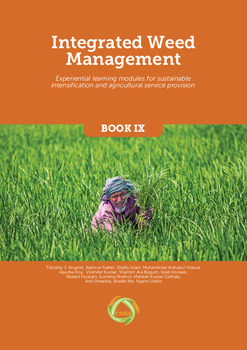Mostrar el registro sencillo del ítem
Integrated weed management: experiential learning modules for sustainable intensification and agricultural service provision
| Autor: | Krupnik, T.J. |
| Autor: | Naher, K. |
| Autor: | Islam, S. |
| Autor: | Hoque, M.A. |
| Autor: | Roy, A. |
| Autor: | Kumar, V. |
| Autor: | Begum, S.A. |
| Autor: | Hossain, I. |
| Autor: | Hossain, K. |
| Autor: | Sumona Shahrin |
| Autor: | Gathala, M.K. |
| Autor: | Shrestha, A. |
| Autor: | Nazim Uddin, S. Md. |
| Año: | 2020 |
| URI: | https://hdl.handle.net/10883/20866 |
| Resumen: | Globally, weeds cause higher agricultural production losses than other agricultural pests. In a systematic review of the evidence on crop production losses, Oerke (2005) wrote that “Estimates on potential and actual losses despite the current crop protection practices are given for wheat, rice, maize, potatoes, soybeans, and cotton … weeds produced the highest potential loss (34%), with animal pests and pathogens being less important (losses of 18 and 16%)”. Weeds are therefore a consistent headache to farmers. They interfere with crops by competing for soil nutrients, light, and water. They are particularly problematic when crops are directly sown by machine, or under conditions of reduced tillage. They also constrain farmers with respect to their time and labor, and constitute an important production cost. This book covers critical topics for the principles and practice of integrated weed management (IWM) in the context of smallholder farming in the tropics, with emphasis on experiential and hands-on learning. The materials within provide a guide for training facilitators to conduct a rapid one-day training on IWM, including detailed instructions on how to facilitate a training, training material requirements, flip charts to facilitate discussions, and pre- and post-tests for training participants. IWM is better learned through multiple training sessions or as part of a farmer field school than in an individual one-day training. Hence while this book details several modular training sessions thatcan be conducted consecutively over a single day, they can also be broken up and applied as individual modules during a season long farmer field school, or for more targeted training sessions. Note also that training in IWM is needed prior to training farmers, machinery service providers (farmers who own equipment or machinery, such as seeding equipment or herbicide sprayers, and charge other farmers for their use on an affordable fee-for-service basis), or others in aspects of direct seeding or the practicalities of conservation agriculture (CA, such as zero- or striptillage). In the latter case, the cultural weed control concept of crop rotation fits nicely with CA principles. For this reason, training facilitators are encouraged to use these IWM modules prior to attempting to train farmers or service providers on these more advanced crop establishment techniques. IWM techniques are also commonly incorporated into the packages of services that agricultural service providers make available for farmer clients. |
| Formato: | |
| Lenguaje: | English |
| Editor: | CIMMYT |
| Nombre de la Serie: | CSISA Experiential learning modules for sustainable intensification and agricultural service provision |
| Copyright: | CIMMYT manages Intellectual Assets as International Public Goods. The user is free to download, print, store and share this work. In case you want to translate or create any other derivative work and share or distribute such translation/derivative work, please contact CIMMYT-Knowledge-Center@cgiar.org indicating the work you want to use and the kind of use you intend; CIMMYT will contact you with the suitable license for that purpose. |
| Tipo: | Book |
| Lugar de publicación: | Mexico |
| Páginas: | vi, 94 pages |
| Serie Número: | Book IX |
| Agrovoc: | WEED CONTROL |
| Agrovoc: | AGRICULTURAL EXTENSION |
| Agrovoc: | SUSTAINABLE AGRICULTURE |
| Agrovoc: | INTENSIFICATION |
Ficheros en el ítem
Este ítem aparece en la(s) siguiente(s) colección(ones)
-
Sustainable Intensification
Sustainable intensification agriculture including topics on cropping systems, agronomy, soil, mechanization, precision agriculture, etc.

